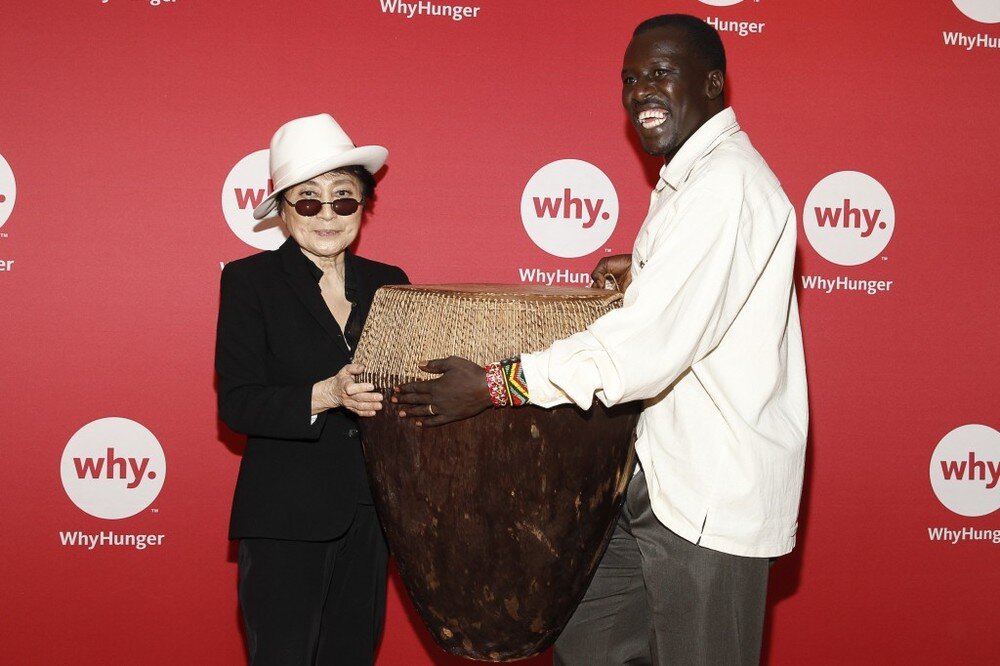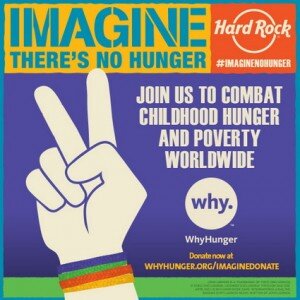WhyHunger's Jen Chapin on the compromises of cause marketing, and how she balances her music and activism
Posted on March 26, 2014 by Cause Effect Agency
CEA recently chatted with WhyHunger board member and singer-songwriter Jen Chapin about the complexities of cause marketing and how she balances her work as a professional musician and activist.
© Nathan James Leatherman
CEA: What is your criteria for an effective corporate cause marketing campaign, such as the Imagine There’s No Hunger campaign WhyHunger does with Hard Rock?
With cause marketing there is always a delicate balance to be struck. I’m anti-consumer in a lot of ways, so I ask, “What’s the impact of the production of this little throw away thing that we’re going to sell for $3? What were the people paid who manufactured this? What’s the carbon footprint? Where was it made?” But it can be paralyzing if you’re thinking like I am, that’s why I say a balance must be struck. And the truth is, I’m also selling myself, selling CDs; I’m selling stainless steel water bottles that I believe in because I hate the whole plastic water bottle thing; but the bottles are made in China, so who knows what really happened on that end? So we’re back to the question of finding that balance of what does more good. I think the good folks at WhyHunger, specifically Noreen Springstead who is the director of Marketing & Fundraising, have had to make a lot of judgment calls and in the end it comes down to relationships, and who you trust. We have a long relationship with Hard Rock and we believe in them. They are on an evolving journey to do the best with their business practices and not be part of the problem. There’s a tradeoff with all this stuff. You kind of have to swing into the culture, and some parts of the culture may benefit you in your fundraising but are also part of the problem, and isn’t that true of most of us, on an individual level?
Hope North Founder Okello Sam with Yoko Ono. CEA client Hope North is a beneficiary of the Imagine There's No Hunger campaign. © WhyHunger
CEA: I remember companies creating (Product) Red merchandise were criticized, sometimes for spending more on marketing their “do-gooding” than actually went to the cause, or for cannibalizing charitable giving. But I felt that was misguided. Someone purchasing the merchandise, even if they are someone who might give to a good cause otherwise, it’s not coming from the same place, the same budget. If you’re going to buy shoes anyway, why not buy shoes that also benefit a worthy cause? And if you’ve done so, is that really going to prevent you from straight-up donating to another cause later that year? It seemed to me that these products generate cash to help people suffering from HIV, or hunger, in your case, that wouldn’t have been there otherwise, and who cares if the companies also want to trumpet the good they have done with billboards and so on?
Yes, so much of WhyHunger’s fundraising comes from selling autographs. For the Imagine There’s No Hunger campaign we have one-of-a-kind autographed guitars and things like that. Somebody comes in and throws down $20,000 and they don’t care a bit about the cause, but we’ll take their money and thank them very much.
Many people might say, “Oh, hunger is always going to be with us, it’s part of the human condition,” and contribute to us or just buy a product, without seeing where we are coming from, which is: hunger should not exist. It does not need to exist. It is not who we are and we want to eliminate it. And we believe that is possible.
CEA: How do you see music’s role in activism and how does that manifest itself in your life?
From the beginning when I realized that personally I needed to commit to music, there was this little voice in my head saying, “Well, there are plenty of musicians in the world. You should go be a teacher. You should really work for a nonprofit.” I’ve always had this struggle of justifying it.
After September 11th, I had a little bit of an epiphany because I was passionately reading the newspaper everyday and dealing with mourning a friend and dealing with the new craziness in our political scene. This was the time of, “You are either with us or against us,” in the political dialogue. I was always trying to reach across boundaries and talk to people and I realized that in music you can just be truthful, that’s your job. Not that I wouldn’t be truthful in my activist or in my political life, but there is a very clear responsibility in music.
The Examiner named Jen's latest album, The Reckoning, one of the top Americana albums of 2013
The Examiner named Jen's latest album, The Reckoning, one of the top Americana albums of 2013
Increasingly people have reached out to me because of the music and recognize that I have some background as an activist and want me to be both of those people at the same time. It has been really gratifying to be able to not feel like I am doing one at the expense of the other.
I was a full time teacher and I’ve done enrichment classes for girls and workshops throughout the country. One of the topics that I love to teach is music in social action and songs that have had an impact in social movements, whether it’s the labor movement, civil rights movement, or the peace movement, and exploring how a song makes an impact. Is it because, with a song like “We Shall Overcome,” you can hear it once and join together, feel part of that community and have strength when faced with power hoses and dogs? Is it because the song is a playful metaphor? Or does the song have impact because it is a devastating metaphor, like “Strange Fruit,” a satirical, incisive song that makes you look at society in a different way? I really believe that music is something to be nurtured, without forcing it, or else it becomes propaganda. It is about finding the delicate balance between art and agenda.
CEA: Agreed, but when a song hits that right balance, the effect is magnificent. I was just at the Brooklyn Art Museum and saw a video of Nina Simone singing “Mississippi Goddammn,” and, wow, that must have hit a chord with white audiences in the 60s. And The Clash’s “Know Your Rights” and “Guns Of Brixton” were powerful for me as a kid, they gave me a sense that activism wasn’t just for hippies! Would you create us a playlist of some of the songs you think mattered most, for inspiring social change and activism?
Of course!
10 Songs That Inspire Social Change- Jen Chapin
1. Strange Fruit, by Abe Meeropol (popularized by Billie Holiday)
2. 41 Shots (American Skin), by Bruce Springsteen
3. Big Brother, by Stevie Wonder
4. Village Ghettoland, by Stevie Wonder
5. Fables of Faubus, by Charles Mingus
6. We Live in Brooklyn, by Roy Ayers
7. Babylon System, by Bob Marley
8. Feed Your Baby, by Jen Chapin
9. Passive People, by Jen Chapin
10. Gospel, by Jen Chapin
Visit WhyHunger’s website to learn more about their work ending hunger.
Click here to learn more about Jen Chapin and her music.



